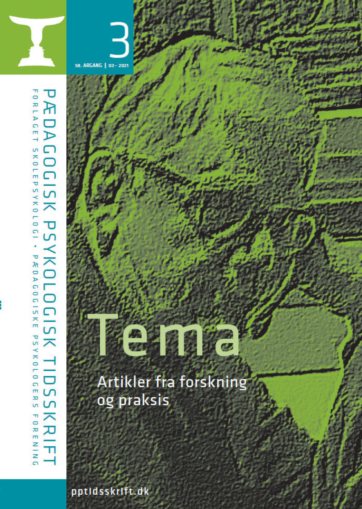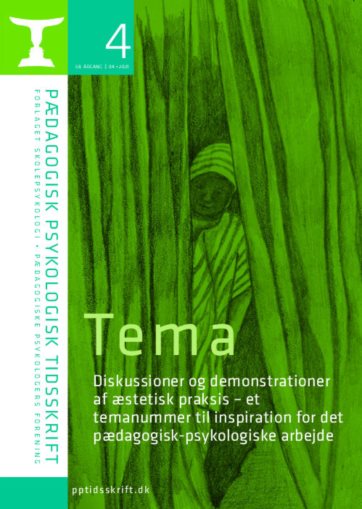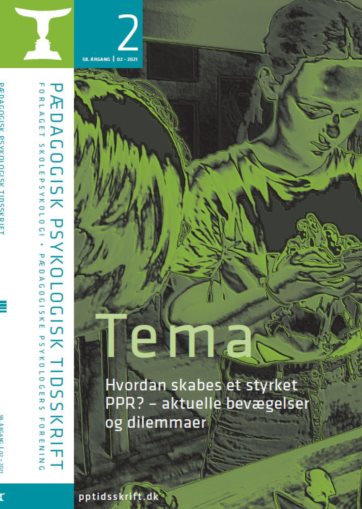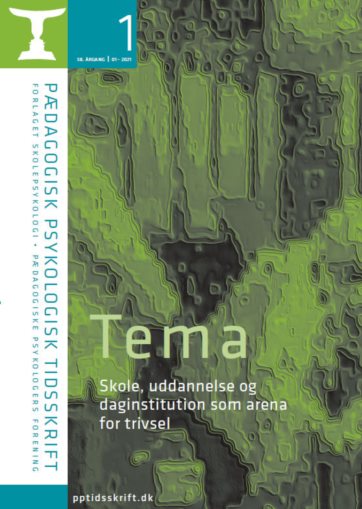Beskrivelse
Abstracts ppt 3/2021: TEMA: Artikler fra forskning og praksis
Anne Sofie Møller Sparre: Don’t forget the children – when parents have high-risk jobs
Children whose parent has a high-risk job, e .g . police officer, doctor, nurse, firefigh- ter, social worker and rescuer, can be mentally affected by secondary exposure .
Children may hear about their parent’s experiences at work, or they might be af- fected because the parent-child relationship is affected . Research shows that adults and parents tend to underestimate how much children experience and are affected by traumatic events . Therefore, we must take care of and be extremely aware of children whose parent has a high-risk job . Actually, children may react themselves because of secondary exposure from their parent’s job . They may react physically, psychologically and socially, by being either over or under involved in people around them . Fortunately, children will be able to handle a lot if they feel safe and secure . Furthermore, many things can be done to take care of these children . Pa- rents and professionals – teachers and care workers – may mentalise these children and understand what they need . They might listen to and talk to children about their thoughts, recognise and correct their worries, create good routines, share their thoughts about why the job is meaningful and how the parents as workers take care of themselves and feel secure, create dispersals and build a sustainable parent- child relationship . If a parent does not have mental surplus to be present and take care of their child, they might ask for help . Parents and professionals might also get advice and guidance from educational psychological counselling . It is crucial that psychologists know about children’s reaction to parents’ high-risk jobs to be aware of how children’s reactions can be caused by secondary exposure and might be understood, handled and supported according to that . Finally, the author emp- hasises that nobody is a perfect parent all the time, but as long as parents and pro- fessionals do remember these children and build sustainable relationships with them, these children will do very well and develop into life strong adults .
Anne Sophie Kjeldahl and Lone Svinth: Pedagogical involvement in children’s play – opportunities and dilemmas
With the implementation of the newly revised Danish Act on Early Childhood Edu- cation and Care (ECEC), children’s play has gained a central role at policy level for the first time in Denmark . Play has now become a statutory part of everyday life in Danish ECEC settings, and the ministry states that the pedagogues “have to use knowledge and skills to create pedagogical learning environments focused on play” . Inspired by these changes, this article aims to investigate how pedagogues involve themselves in children’s play and which possibilities and dilemmas the involvement has for the social play environment and children’s participation in play . The study draws on sociocultural theory and concepts . Especially Rogoff et al .’s (1993) concept of guided participation plays a significant role in the study . This qualitative study consists of four days of participatory observations followed by two semi structured interviews with two pre-school teachers in a Danish ECEC for children aged 3 to 6 years .
We find that the pedagogues’ involvement can create opportunities for expanding children’s participation in a fruitful way . Furthermore, we find that the involve- ment in children’s social play environment is both complex and involves many di- lemmas .
Christopher Kehlet Ebbrecht and Preben Bertelsen: How do we support adolescents in getting a good enough grip on life?
In this article, we argue that Danish adolescents who experience high stress levels do so due to being placed in a catch-22 situation by the neoliberal competitive state; it is stressful both to live in accordance with and in defiance of the endless demands on individual performance . To avoid a stressful life, individuals must be able to step out of such a neoliberal double bind . Theories on formation and educational psychology can often be vague and unilateral in the claim that counteracting esca- lating social pathologies, like increasing incidents of stress, calls solely for socio-po- litical and structural change . In this article, we argue in favour of a dialectic per- spective in which structural change also requires individuals being capable of such change – individually and collectively . Our study illustrates how this can be done by developing and forming generic universal human life skills .
Hanne Føns and Marlene Smith: Absence begins early and is embedded in relational and structural conditions – A case study on the perspectives on school absence of children and parents
School absence is a complex and current issue in which the voice of children and pa- rents is poorly heard in relation to the explanation of causes . This article is based on a case study, which aims to explore patterns and contexts on school absence, ba- sed on the perspective of six children and parents .
The study applies a socio-economic perspective of school absence and points to three general themes that are significant to understand the phenomenon: Absence begins early on, The School as Important Opponent and Co-opponent and School Absence is Embedded in Organisational and Societal Conditions. The themes expo- se that absence often begins in the pre-school age as absence due to [failure to thri- ve] already has its debut when the children attend daycare centres . Relational and collaborative conditions between the home and the school are attributed to have significant importance when children and parents should explain school absence . Structural conditions to which the school is subjected seem to be at the centre of the issue, too .
Line Graff and Louise Wittendorff Jensen: School absenteeism has severe consequences on the individual, as well as on a societal level
School absenteeism has severe consequences on the individual, as well as on a soci- etal level . Research in Denmark and internationally shows that we should be better at preventing and intervening when children are absent from school .
In the municipality of Hillerød, the programme “I Skole Igen” has developed a specialised and interdisciplinary programme that can offer help to children with school absenteeism in a treatment based on principles from cognitive behavioural therapy and systemic thinking .
The purpose of this study was to test whether the treatment had the desired ef- fect on children’s school absenteeism in the form of better school attendance and if more children with absenteeism could benefit from the treatment, as it is home-ba- sed .
Furthermore, the wish was to make recommendations for further research and work on developing treatment programmes in the municipalities .
The preliminary results indicated that the treatment had an effect on the children’s school absence in the form of better school attendance .
Mogens Nygaard Christoffersen: Screening for psychological maltreatment
The lack of consideration on issues related to psychological maltreatment is one of the most significant reasons for the failure of child protective services . The study describes three screening questionnaires to determine whether a child has been psychologically maltreated . About 2% of infants were exposed to psychological mal- treatment according to screening tests performed by health nurses, while approxi- mately 5 .2% of 25-year-olds had been exposed to psychological maltreatment accor- ding to a self-completed screening test . According to screening tests performed by child caseworkers, the prevalence among children in child protection services was one-third (36%) .
Children exposed to psychological maltreatment showed higher rates of PTSD, anxiety, substance abuse, suicidal tendencies, or non-Suicidal Self-Injury (NSSI) than those who were not exposed to psychological maltreatment . Results indicated that the child displayed a reduced risk of reactive symptoms only when parental be- haviour improved, and abuse and neglect were reduced . Results further imply that increasing social support from significant others may reduce the likelihood of NSSI when exposed to psychological maltreatment .
Ole Løw: Guidance format that combines an action-oriented and a reflective starting point for co-teaching in school.
The article presents a guidance format that combines an action-oriented and reflec- tive starting point for co-teaching in school . Such a professional guidance foundati- on will be able to strengthen the professionals’ judgment .
Thomas Gylling-Andersen: A case example of how a well-being interventi- on was developed through a close interdisciplinary collaboration between a psychologist (soon to graduate) and a fifth-grade teacher at a Danish primary school.
The article aims to give a case example of how a well-being intervention was de- veloped through a close interdisciplinary collaboration between a psychologist (soon to graduate) and a fifth-grade teacher at a Danish primary school, which is to show how one can meet the current Danish political request that stipulates that pedago- gical-psychological counsellors should enter into closer collaborations with the pro- fessionals of the schools they work with . The article is centred around the story of how the well-being intervention ‘My classmate in pictures’ was developed, imple- mented and evaluated . Here it is shown how the intervention was aimed both to- wards a specific child, Anton, who didn’t thrive due to his locked and lonely position amongst his peers and towards the entire community of children . Within a theoreti- cal framework of German-Scandinavian critical psychology, the methodological con- siderations and subsequent analysis centre around the aim to expand the children’s scope of possibilities for them to develop their agency . Finally, it is discussed how the article’s analysis and methodological considerations can be used to rethink how professionals are encouraged to work when the aim is to improve school children’s well-being .



